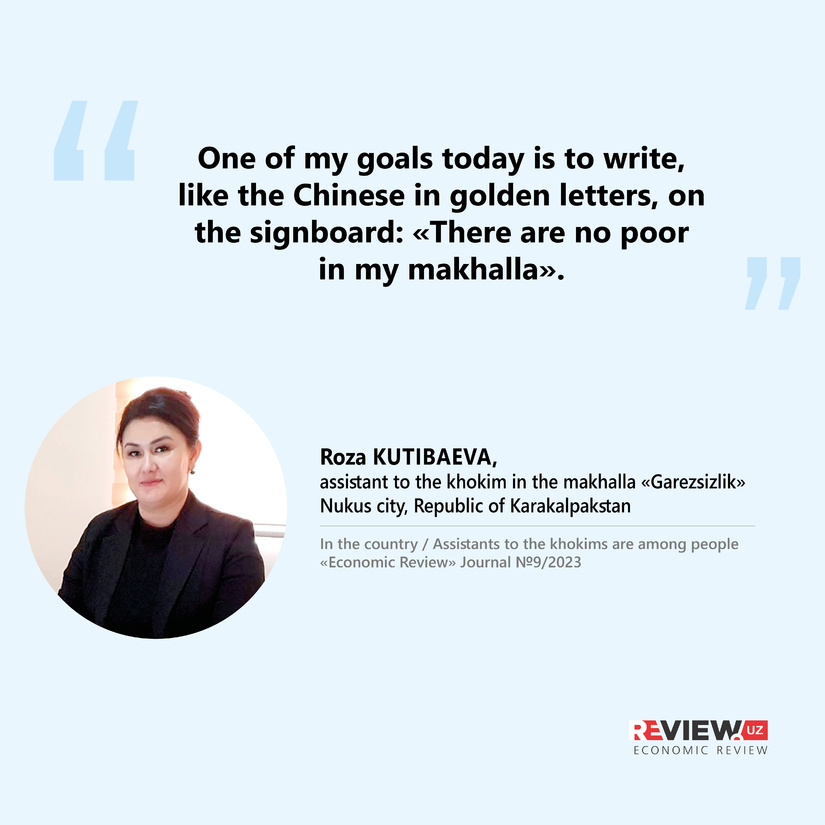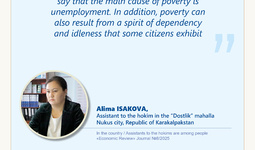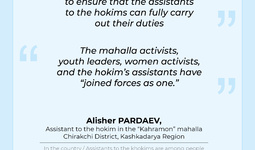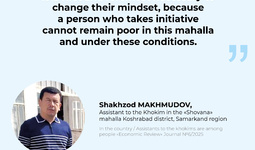— In our country, the "makhallabay" system was introduced for the first time. What is the nature of this position for you, how do you see and understand it?
— This position, created on the initiative of the President, was introduced in order to ensure the interests of the people and ease their burden. The khokim may not be able to visit each makhalla, but his assistants on the ground have detailed information about the problems of each household in the makhallas, which allows solving the problems identified in the regions in a short time, without unnecessary paperwork. Thanks to this, citizens began to have a sense of gratitude to the state, which was our highest goal. I will not be mistaken if I say that all our work is done to ensure human dignity.
— Tell us more about yourself and how you came to this position. What is your past work experience that allows you to solve the tasks assigned to the assistants to the khokims?
— I started work in July last year. Prior to that, I was an English teacher at secondary school No. 22. Having heard that there is a vacancy in this direction, I offered my candidacy. I moved to the gathering of citizens of the makhalla, where I now work, in 2021. My previous work experience helped me in communicating with citizens. I will not be mistaken if I say that a good opportunity was to show respect for me as a teacher. I speak a foreign language, which is why I went to China to study experience, which was very useful for our activities.
— Which social groups of the population make up the majority in the mahalla, how many poor and people in need of social protection?
— Total number of households in the makhalla — 2001, population — 4123, families — 2076. Of these, 68 are in the 1st category; 1044 are in the 2nd category; 40 are in the 3rd category. The number of citizens in need of assistance has reached 86, at the moment 31 unemployed persons have been identified. A specific action plan has been developed to provide targeted assistance to citizens included in the category of those in need of assistance. It is currently being implemented.
— How did you manage to establish contact with the residents of the makhalla?
— As soon as I started working in the makhalla, I created a group in Telegram. All citizens living in the makhalla became its members. Every day, together with active citizens, we discuss the problems of the makhalla and exchange ideas on how to solve them. People have the opportunity to communicate through these groups, even if they cannot come to the makhalla office in person.
— As an assistant to the khokim, you conducted a number of studies and surveys in your makhalla. Please tell us more about their results. What did you manage to determine?
— As an assistant to the khokim, I conducted an online survey in the Telegram group of the makhalla on the topic "What problems are bothering you?". According to the results of the responses, it was revealed that it was necessary to organize playgrounds, install surveillance cameras and increase the number of lighting lamps. At present, practical work on solving these issues continues. In general, many issues are controlled within the framework of a constant dialogue with the people and are resolved by responsible persons.
— Based on the results of the conducted research and studies, what are the main causes of poverty among the residents of the makhalla? What approaches have you developed to overcome them and solve existing problems?
— A lot of jobs have been created in the makhalla, but according to the information received during the census, we learned that the wages issued do not really satisfy citizens. Almost all citizens live in prosperous households and most of them work in government organizations. During my activity, 8 unemployed citizens and persons belonging to the "Women's Notebook" were provided with equipment on the basis of a subsidy of 60 million sums. Today, these citizens operate on the basis of self-employment.
— Tell us, what work has been done in terms of social support for the residents of the makhalla?
— Together with the head of the makhalla, women's activists and youth leaders, a "road map" was developed in order to work together with the unemployed and citizens in need of social protection and provide them with assistance. On the basis of this "roadmap", unemployed and citizens in need of social protection were trained in professions in mono-centers for starting business activities for a year, they were assisted in purchasing equipment on the basis of subsidies and preferential loans.
— Based on your experience, please tell me what are the reasons for the cases of poverty recorded in the makhalla? What else do you think needs to be done to reduce the level of poverty in the makhalla?
— During the census, it was found that 31 citizens suffer from unemployment. They were sent to get a profession and are now on the eve of graduation in a new specialty. I think we should be able to teach our citizens that poverty is a shameful concept and apply the Chinese experience in combating poverty. I am for the support of citizens who are not idle and somehow trying to feed their families.
— For the sustainable development of the makhalla, the availability and condition of transport, energy, utilities, social and other infrastructure is important. In this regard, how can you describe the problems in the makhalla? What are you doing to solve them and improve the makhalla?
— Since the makhalla is located in the center of the city of Nukus, we have no problems with gas, electricity and water. Local citizens are also very actively engaged in landscaping, every weekend we arrange a hashar, we try to make the territory more beautiful and well-maintained. In addition, the fact that the state has been paying great attention to the socio-economic development of the Republic of Karakalpakstan in recent years, and the fact that huge funds are allocated for these works, plays an important role in this.
— Have you conducted a survey to determine the main "growth points" that can best ensure the economic development of your mahalla?
— As mentioned above, the makhalla specializes in providing services, most residents work in this direction. Also, one of our tasks today is to create additional jobs through the development of the manufacturing sector. To do this, there are enough infrastructural opportunities in the makhalla.
— What has changed in the makhalla during your activity? How do the residents treat you? Has their confidence in the institute of assistants to the khokims and the makhallabay system as a whole increased? Tell us about your plans for the future.
— During my activity, I have created 10 new business entities, which today seek to employ unemployed citizens of the makhalla. Of course, residents also see this, and it becomes especially joyful and pleasant when you hear such words: "Previously, in order to obtain a loan and establish entrepreneurship, our whole life was spent in visiting offices, and when the assistants to the khokims took up their duties, we were able to start our business activities without any obstacles." The main thing is to benefit the people.
One of my goals today is to write, like the Chinese in golden letters, on the signboard: "There are no poor people in my makhalla." Next, I will work even harder in this position and will definitely justify the trust placed in me by the President and the people.
Jamoliddin Turdimov, CERR
"Economic Review" Journal №9/2023





















leave a comment